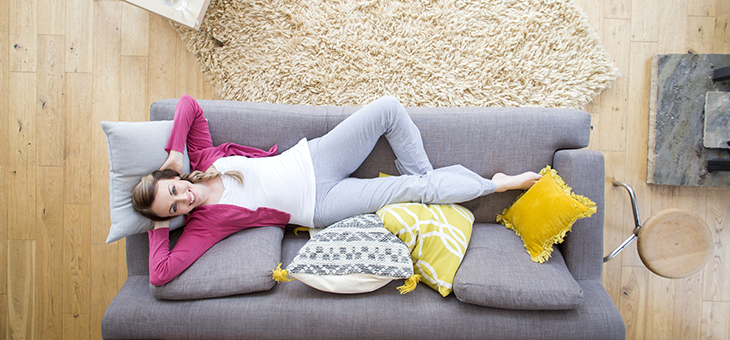Ever asked a colleague, ‘What are you up to this weekend?’ and they reply, ‘Nothing really, it’s going to be a quiet one’, to which you add, ‘Ooh, that’s nice, sometimes that’s just what you need, isn’t it?’
And it’s true. It is just what you need – sometimes.
Sometimes a quiet weekend is an absolute gift, a much-needed chance to relax and recharge.
But sometimes a quiet weekend can feel like a punishment, another cruel reminder of how empty time can feel if you’re a little lonely or isolated.
As a (self-appointed) self-care ambassador, I’m a huge fan of the quiet weekend – when no plan is the plan, you’re in no hurry at all and fully intend to spend the whole day pottering, sipping tea and dipping in and out of whatever you fancy on TV (and loving every second of it, thank you very much). But I’ve come to realise that mastering them can be challenging – and those challenges very much depend on where you’re at personally at any given time.
Popular plans right now
But I want to be busy …
There’s comfort and validation in being busy, needed and in demand – but, of course, there’s also a tipping point; learning to recognise the signs and carve out space to relax is the challenge.
On the flip side, not being busy, needed and in demand can be sad and frightening – finding meaningful ways to fill your time and avoiding soul-ache becomes the challenge.
But, whatever our circumstances, there are steps we can take to try and master quiet weekends.
Recognise where you’re at
The first step is to acknowledge where you are at – with zero guilt – and don’t be tempted to compare.
If life’s been mega busy, you’re frazzled and would give anything for a break from the grandkids/neighbours/errands, then that’s where you’re at. If life’s been really slow and boring, your love life and plans have dried up and you’re feeling pretty crap about that, then that’s where you’re at.
It’s not about whose grass is greenest, or who’s got it hardest, or justifying your needs by how they compare to others. “No-one is immune from struggle, it’s often just the nature of that struggle that is different,” says psychologist and health coach Suzy Reading (suzyreading.co.uk).
Social media, of course, feeds those self-comparison habits. But, ‘Doctor of Happiness’ Andy Cope, co-author of the new Happiness: Your Route Map To Inner Joy, points out that we “know social media’s not real”.
“You go on holiday – you don’t put all your grotty photos on there, do you? You post your top five photos,” he states. “Stop comparing yourself with others; compare yourself with yourself – how could you feel a bit better or happier than you did yesterday?”
All about the context
If quiet weekends have lost their joy – because, frankly, you’ve had your fill, or your empty diary is filling you with dread and self-doubt – then some reframing might help.
Of course, sometimes life is tough, with periods of loneliness, health battles or changes in circumstances, and there’s no shortcut to getting out. But if it’s just a question of struggling to fill weekends, Dr Cope says sometimes we all need to step out of our comfort zone. “If you haven’t got a partner or family, then weekends can be a bit of a drag. You do need to force yourself sometimes, go and make yourself do things.”
A decade spent researching positive psychology and happiness has taught him a few things. Dr Cope points out that, as humans, we need meaningful connections with other humans – but don’t fall into the trap of feeding social media connections more than real-life ones, because they’re not the same.
Don’t add too much pressure and be kind to yourself – putting yourself out there can be daunting – but taking a few small positive actions will help transform how you approach and view your time.
“If another quiet weekend fills you with dread, get proactive on using that time for something you find uplifting,” suggests Ms Reading. “Make plans you’re excited about. Use the solo time to devour podcasts, music, creative pursuits, or take an online course and expand your mind.”
The self-care factor
“The art is in the mindful choosing of how we fill our time and the lens through which we view our circumstances. It’s about identifying how we are feeling and using this time as our self-care,” adds Ms Reading. “A quiet weekend at home can be delicious, especially when life is usually full and weekends are often spent rushing from one engagement to the next. Equally, we can fritter away a quiet weekend unless we put a ring on that time, check in with how we are feeling and mindfully choose what we do. A quiet weekend can be deeply restorative.”
But this deep restoration won’t happen if you don’t let it – so learning to prioritise self-care is important. It’s self-care that allows us to keep juggling the balls of life effectively and with longevity. It’s self-care that increases our sense of ownership of who we are, and which ultimately leads us to feel as fulfilled as possible.
The best thing about quiet weekends? You make the rules. Boxsets, baking, organising your bookshelf … Cinema, coffee shops, a walk … You decide. It’s not what you do with the time that counts, but doing it with purpose – and if that purpose is simply to savour the slowness and quiet, then we salute you!
Are you a fan of the quiet weekend or do you prefer to be busy? What’s your go-to activity when you have a bit of time to yourself? Let us know in the comments section below.
Also read: Three men share their self-care stories to mark International Men’s Day
– With PA

